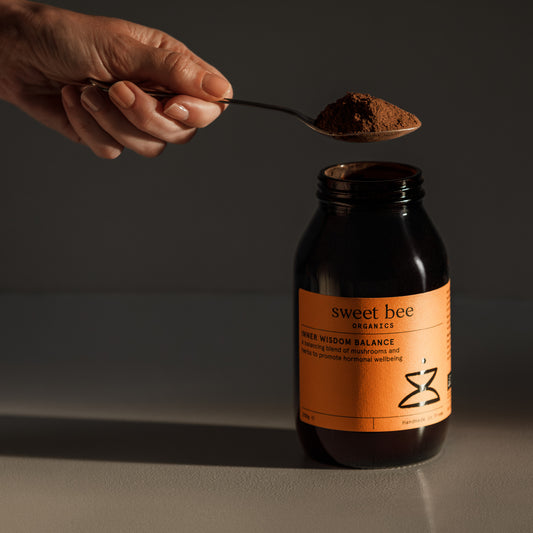Part 1 of 3: The Suzy Shinner Wellness Series

EDITORS NOTE:
We're delighted to welcome Suzy Shinner, registered Nutritional Therapist and women's hormone health specialist, as our newest expert contributor. Suzy’s evidence-based approach and genuine care for women’s wellbeing make her the perfect addition to our health and wellness community. This is the first in an exclusive three-part series where Suzy shares her insights on stress, hormones, and natural solutions for modern women.
Each post is designed to cut through the noise and give you actionable, expert-backed strategies to support your wellbeing naturally. Let’s dive into part 1: understanding what our modern world is really doing to our stress levels…
Cave Girl vs Modern Day Woman: The Real Impact of Cortisol on Your Body
We might think we've got it pretty good compared to our ancestors, but what is the modern world really doing to your stress levels?
Back in the day, stress might have come in the form of a saber-toothed tiger, but now it's an endless stream of work emails, news alerts, traffic jams and endless to-do lists. So what's this doing to our bodies, and what can we do about it?
I'm Suzy, a registered Nutritional Therapist specializing in female hormone health, and in this article I'm delving into the effect of cortisol in our modern world and how it might be impacting your health.
Let’s take ourselves back a few thousand years. Imagine that you’re out foraging in the woods at dusk, when you hear a noise coming from the depths of the forest. A flash of orange through the trees, a pair of amber eyes in the gloom. Something is watching you. You stay still and listen. Your heart starts to beat faster, your breathing quickens, your pupils dilate, your muscles feel activated. You feel alert, alive and ready to run.
This is our ‘fight or flight’ mode; our body’s response to stress, perfectly adapted to help us in a real, life-threatening situation. But what’s actually going on in the body when we feel stressed? When we experience stress, whether real or perceived, the hypothalamus in our brain sets off a cascade of hormones and neurotransmitters, which ultimately ends in the release of cortisol (one of our main stress hormones) and adrenaline from our adrenal glands.
These hormones give us the short-term boost we need to deal with a tiger in the woods – blood pumps to our muscles ready for action, our pupils dilate making our vision clearer, glucose is released into the bloodstream giving us energy to run away or fight. Other bodily systems, like our digestive, immune and reproductive systems, temporarily shut down – because now’s not the time to be digesting a meal, fighting a cold, or having babies. Once the stress has gone, a negative feedback loop switches off this stress response, and our body should return to normal. (Until the next time we spot a tiger in the woods!)
At this point, it’s also worth mentioning what ‘stress’ is. Stress is not only psychological, but can be physical too. Think overexercise, lack of sleep, illness or infection, poor diet, excess caffeine, and toxic exposure – all of these can add to our stress load.
Now back to the modern world. Picture the scene. You wake up early to a beeping alarm clock, feeling exhausted. You immediately check your phone and see a load of notifications, including some work emails you need to deal with urgently. You make a strong coffee, skipping breakfast, and hot foot it to your HIIT class. You commute on a packed train (which is delayed!), standing up in someone’s armpit. Work is full on, and you’re rushing around all day, wolfing down lunch at your desk while responding to messages. In the evening you scroll on Instagram (terrible), check the news (even more terrible) and binge on a crime series on Netflix (lots of violence and shouting), before you crash into bed, still looking at your phone. Until tomorrow, when you do it all again!
Unfortunately for our health, many of us are being bombarded with stress from the moment we wake up in the morning to the moment we go to sleep. It might not be as life-threatening as a tiger, but this kind of low-level stress can have a real impact on our health and hormones.
So what happens when stress becomes chronic?
As you may have guessed, we weren’t designed to be constantly exposed to stress. If this stress is sustained, our body’s stress response can become dysregulated, leading to too much, and then too little, cortisol.
Some signs of high cortisol include:
•Disrupted sleep, especially waking up in the middle of the night
•High blood pressure
•Poor immunity
•Weight gain
•Anxiety / panic attacks
•Imbalanced blood sugar levels
•Hormone imbalances
And some signs of low cortisol:
•Low mood / motivation
•Low libido
•Sleep issues
•Low blood pressure
•Feeling weak / fainting
•Poor memory and concentration
•Muscle weakness and joint pain
So how can we support stress?
Stress management doesn’t need to be time-consuming, complicated or mega expensive. Here are a few tips I often share with my clients to help manage stress, reduce cortisol naturally, and bring more calm and balance into their lives:
1. Managing or reducing stressors in your life as far as you can. Set boundaries, ask for help and don’t be afraid to say no.
2. Build in some kind of mindfulness practice that feels good to you. Maybe going to bed earlier to read your book, going for a walk in the park at lunchtime, or sitting outside in the garden with your morning cuppa.
3. Try to get outside and expose yourself to natural light first thing in the morning, and reduce screen time at night, to help set your circadian rhythm (your body clock).
4. Focus on eating three balanced meals a day with protein, lots of colorful veggies and some healthy fats. Reduce sugary snacks and stimulants like caffeine and alcohol if you’re feeling stressed. Sweet Bee’s Inner Wisdom Balance is a nice decaf alternative if you fancy a mid-afternoon pick me up.
5. Magnesium supports a healthy nervous system and can help reduce cortisol levels, easing stress and anxiety. Why not create a relaxing nighttime ritual with Sweet Bee’s Sweet Sleep Magnesium Butter Sweet Sleep Magnesium Butter?
Remember, stress management doesn't need to be time-consuming, complicated or expensive. Small, consistent changes can make a profound difference to how your body handles the demands of modern life.
Sweet dreams and healthy wishes,
Suzy x
**Coming Next in The Suzy Shinner Wellness Series:** Think you know the truth about your hormones? Part 2 reveals the biggest myths that could be sabotaging your wellbeing - including some "facts" that might surprise you. From caffeine's hidden effects to the real signs of hormone imbalance, Suzy's debunking the misconceptions that keep women from feeling their best.
Products in this article





